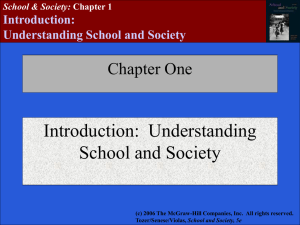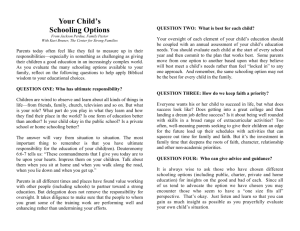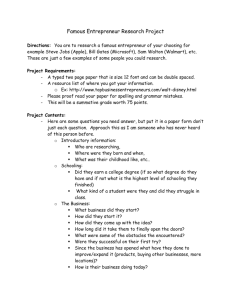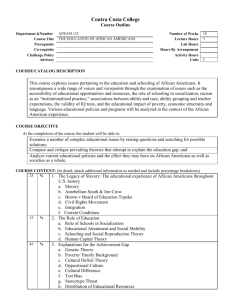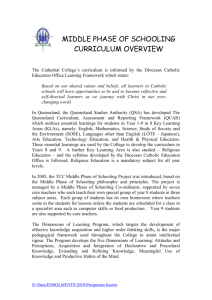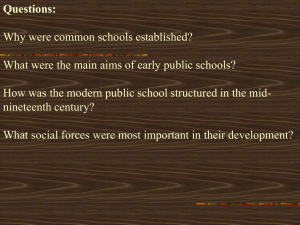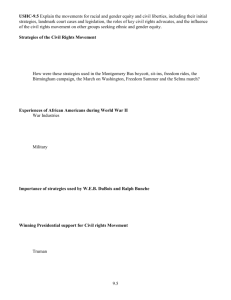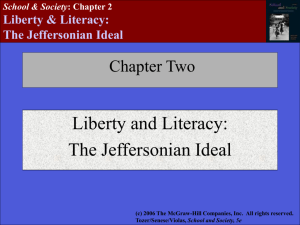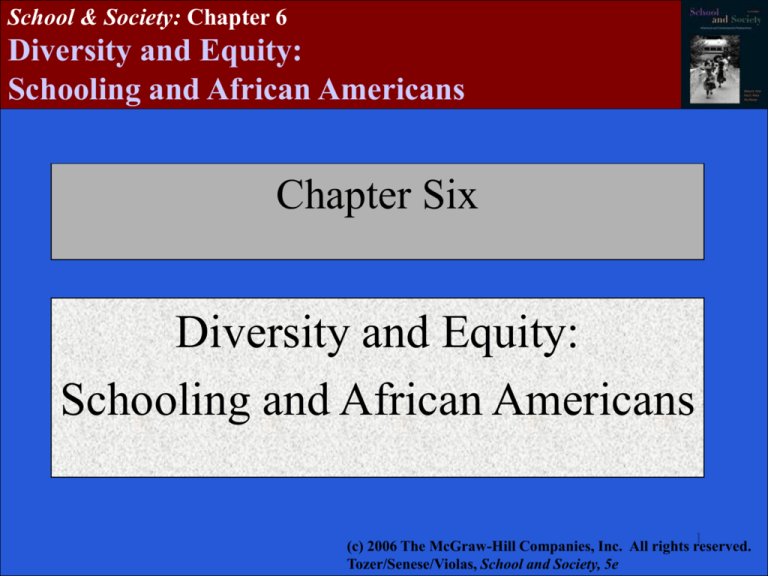
School & Society: Chapter 6
Diversity and Equity:
Schooling and African Americans
Chapter Six
Diversity and Equity:
Schooling and African Americans
1
(c) 2006 The McGraw-Hill Companies, Inc. All rights reserved.
Tozer/Senese/Violas, School and Society, 5e
School & Society: Chapter 6
Diversity and Equity:
Schooling and African Americans
Reconstruction 1865-1877
• Thirteenth Amendment
• Freedmen's Bureau
• Rebuilding the South without slavery
at its center
• Higher education and political power
for African Americans
2
(c) 2006 The McGraw-Hill Companies, Inc. All rights reserved.
Tozer/Senese/Violas, School and Society, 5e
School & Society: Chapter 6
Diversity and Equity:
Schooling and African Americans
Redemption 1877
• White southerners regain control
• White supremacy laws and voting
requirements for blacks established
• Destroyed African American gains
of Reconstruction
3
(c) 2006 The McGraw-Hill Companies, Inc. All rights reserved.
Tozer/Senese/Violas, School and Society, 5e
School & Society: Chapter 6
Diversity and Equity:
Schooling and African Americans
African American Schooling
• Vague references to education in state
constitutions give way to frameworks for universal
public schooling in Reconstruction
• Redemption brought renewed efforts to shift
resources to white schools, strip blacks of voting
rights, and reconfigure constitutions
• Black communities, churches, and private citizens
supported schools while disparities increased,
beginning around 1890
4
(c) 2006 The McGraw-Hill Companies, Inc. All rights reserved.
Tozer/Senese/Violas, School and Society, 5e
School & Society: Chapter 6
Diversity and Equity:
Schooling and African Americans
Booker T. Washington’s Career
• The Myth
advanced public education in black communities
“lifting veil of ignorance from Negro race”
• The Reality
Washington era featured worst treatment of black public
education since slavery
supported state-enforced illiteracy
took accommodationist stance
5
(c) 2006 The McGraw-Hill Companies, Inc. All rights reserved.
Tozer/Senese/Violas, School and Society, 5e
School & Society: Chapter 6
Diversity and Equity:
Schooling and African Americans
Washington’s Perception of African
American “Inferiority” and Opportunity
• Racial(Darwinian) evolution
Blacks need to “evolve”; should be grateful for
advantages.
• Blacks unfit to vote
• Blacks should avoid confronting racial prejudice
• Hard labor and accumulation of property the key
to success
• Natural laws of economics would not tolerate
racism
6
(c) 2006 The McGraw-Hill Companies, Inc. All rights reserved.
Tozer/Senese/Violas, School and Society, 5e
School & Society: Chapter 6
Diversity and Equity:
Schooling and African Americans
W. E. B. Du Bois
• Opposed stifling of criticisms of
Washington and his followers
• Spoke out against continued
oppression of black Southerners and
prejudice in the North
• Self-assertion rather than acquiescence
7
(c) 2006 The McGraw-Hill Companies, Inc. All rights reserved.
Tozer/Senese/Violas, School and Society, 5e
School & Society: Chapter 6
Diversity and Equity:
Schooling and African Americans
Concluding Remarks
• The struggle over African American schooling, and the
distinctions between Washington’s and Du Bois’s
perspectives, highlight enduring concerns:
schooling for social stability or a free society?
schooling for employment or intellectual growth?
schooling for social reform or individual human
development?
schooling that emphasizes commonalities or
differences?
schooling in whose interests?
8
(c) 2006 The McGraw-Hill Companies, Inc. All rights reserved.
Tozer/Senese/Violas, School and Society, 5e
School & Society: Chapter 6
Diversity and Equity:
Schooling and African Americans
Developing your Professional Vocabulary
•
•
•
•
•
black codes
The Crisis
W. E. B. Du Bois
Freedmen's Bureau
historically black
colleges
• Mississippi Plan
•
•
•
•
NAACP
Reconstruction
Redemption
13th, 14th, 15th
Amendments
• Tuskegee Institution
• Booker T. Washington
9
(c) 2006 The McGraw-Hill Companies, Inc. All rights reserved.
Tozer/Senese/Violas, School and Society, 5e

